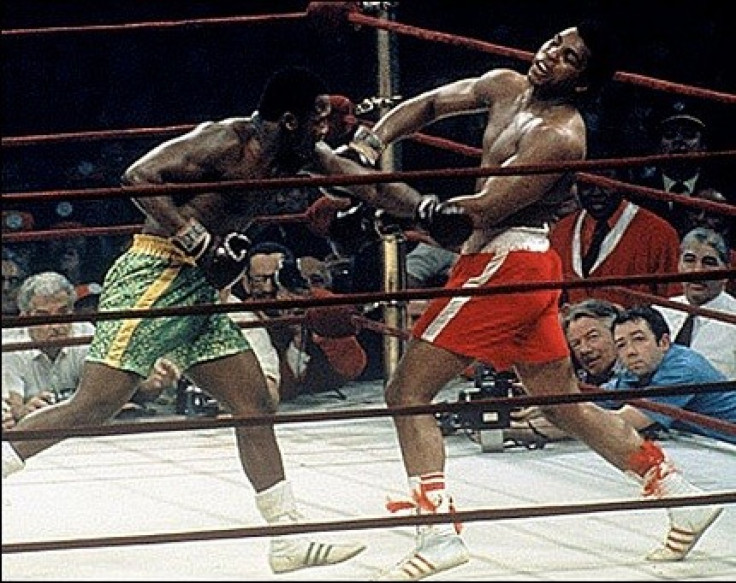Boxing Great Joe Frazier Dead of Cancer at 67

Joe Frazier, the relentless slugger who became the heavyweight champion of the world and earned boxing immortality with three epic battles against Muhammad Ali, died Monday at age 67, his personal manager said.
Smokin' Joe Frazier, who was the first boxer to beat Ali, died in Philadelphia a month after being diagnosed with liver cancer. Leslie Wolff, Frazier's personal trainer, confirmed his death.
Frazier won the Olympic heavyweight boxing gold medal for the United States in 1964 in Tokyo and held the world heavyweight boxing crown from 1970 to 1973.
He is eternally linked with Ali thanks to their trilogy of fights in the 1970s, among the most famous in the history of the sport. Frazier won the first and Ali took the next two.
While both fighters were American blacks and Olympic gold medalists, their personalities could not have been more different. Ali was a charismatic self-promoter. Frazier was a proud, no-nonsense man who dropped out of school at age 13.
Frazier won the world heavyweight title in 1970, knocking out champion Jimmy Ellis, after Ali had been stripped of the championship in 1967 for refusing to fight in the Vietnam War due to his Muslim beliefs.
Ali was reinstated in boxing and met Frazier on March 8, 1971 at New York's Madison Square Garden, in a bout billed as The Fight of the Century. Frazier sent Ali to the canvas with a left hook in the 15th round. Ali got up but Frazier won by unanimous decision.
The brutal encounter left both men hospitalized. Frazier later lost his title in 1973 to hard-hitting George Foreman.
The second Ali-Frazier fight was on January 28, 1974, again at Madison Square Garden, with Ali winning a 12-round decision.
Ali then beat Foreman to reclaim the championship. He defended it in the third Frazier fight on October 1, 1975, in an encounter in the Philippines known as The Thrilla in Manila -- one of the most famous sporting events of the 20th century.
TECHNICAL KNOCKOUT
The two punished each other for 14 rounds, then Frazier's trainer and cornerman Eddie Futch stopped the fight before the 15th round, while Frazier fumed in the ring corner, one of his eyes swollen shut. Frazier never forgave Futch for giving Ali a victory by technical knockout.
The Ali-Frazier rivalry was waged not only in a boxing ring. Ali ridiculed Frazier as a gorilla and an Uncle Tom, a deeply insulting term referring to a black who acts in a humiliatingly subservient way toward whites.
For his part, Frazier insisted on calling his foe Cassius Clay, the birth name that Ali changed in 1964 for a Muslim name.
Frazier remained bitter toward Ali for decades.
I am who I am, and yes, I whipped Ali all three times, Frazier told the New York Times in 2006.
Ali always said I would be nothing without him, Frazier said. But who would he have been without me?
Frazier was born in segregated South Carolina in 1944, the youngest of 12 children. He said his uncle told him when he was a boy he would become the next Joe Louis, the celebrated black heavyweight champion of the 1930s and 1940s. Moving to Philadelphia, he aimed to make good on that prediction.
Frazier amassed a career record of 32-4-1. He retired after a second loss to Foreman in 1976, then came out of retirement for a fight in 1981 before ending his career for good. His only losses were to Ali and Foreman.
Ali became a beloved sports legend but Frazier was never embraced the same way. He also lost almost all of his money. He lived alone in an apartment above the gym where he trained young fighters in a run-down section of Philadelphia.
Frazier in the 1980s managed the boxing career of his eldest son, Marvis, who was best known for devastating knockout losses to champions Larry Holmes and Mike Tyson. Frazier's daughter Jacquelyn Frazier-Lyde entered women's boxing and fought Ali's daughter Laila, losing on a decision in 2001.
(Written by Will Dunham; Editing by Bill Trott and Vicki Allen)
© Copyright Thomson Reuters 2024. All rights reserved.











